Final Fantasy VII reshaped the gaming landscape through its cinematic storytelling and profound character development. The game’s narrative explores themes of loss and redemption, while its memorable score enhances emotional engagement. Key character arcs, such as Cloud Strife’s journey and Tifa Lockhart’s evolution, demonstrate significant growth. Additionally, the unique musical composition by Nobuo Uematsu further solidifies its cultural impact and legacy in the gaming industry.
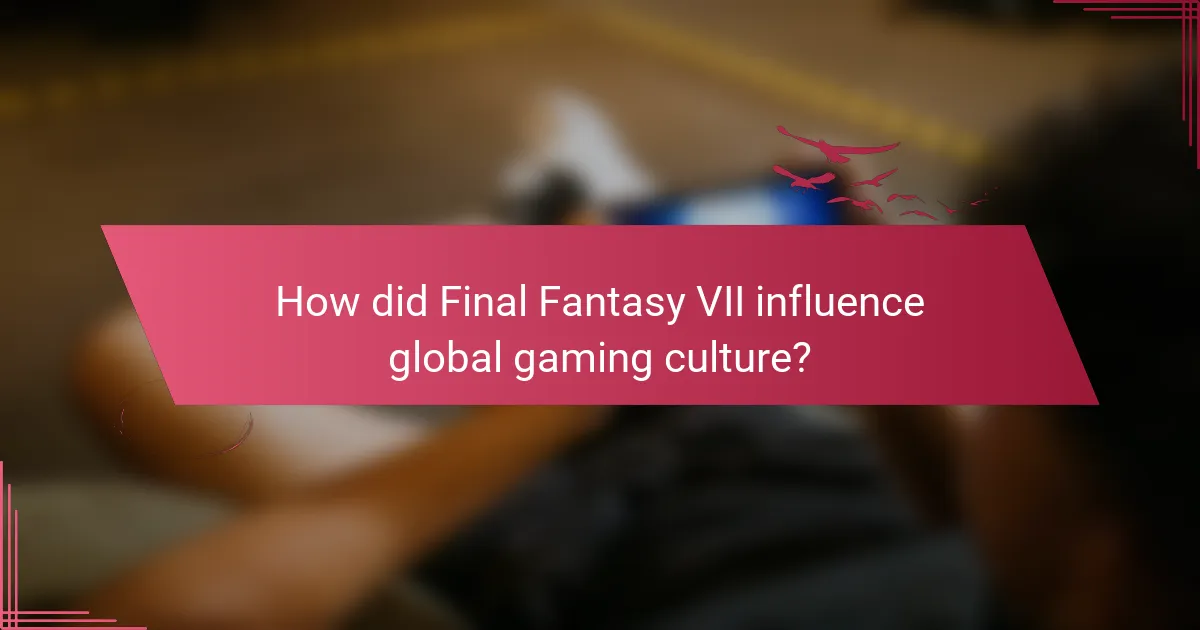
How did Final Fantasy VII influence global gaming culture?
Final Fantasy VII significantly influenced global gaming culture by introducing cinematic storytelling and deep character development. Its narrative complexity set a new standard for RPGs, captivating players with themes of loss and redemption. The game’s memorable score, composed by Nobuo Uematsu, enhanced emotional engagement, further solidifying its cultural impact. Additionally, Final Fantasy VII’s unique blend of technology and fantasy inspired countless titles, shaping the evolution of video game design and narrative structures.
What themes in Final Fantasy VII resonated with players?
Final Fantasy VII resonated with players through its deep character development, exploring themes of identity and loss. The game’s cultural impact is significant, influencing storytelling in RPGs. Its musical score, composed by Nobuo Uematsu, evokes strong emotions and enhances the narrative experience. Players connect with the characters’ struggles, particularly Cloud and Sephiroth, reflecting unique attributes of heroism and villainy. The game’s themes of environmentalism and the consequences of technology resonate with contemporary issues, making it timeless.
Which cultural references are embedded in Final Fantasy VII?
Final Fantasy VII incorporates various cultural references, including elements from Japanese mythology, Western literature, and environmental themes. The character Cloud Strife reflects the archetype of the reluctant hero, influenced by classic narratives. Additionally, the game’s music, composed by Nobuo Uematsu, draws inspiration from diverse musical genres, enhancing its cultural resonance. The portrayal of corporate greed mirrors real-world environmental issues, grounding the fantasy in contemporary societal concerns.
How has Final Fantasy VII shaped the RPG genre?
Final Fantasy VII has significantly shaped the RPG genre by introducing cinematic storytelling, complex character arcs, and an iconic musical score. Its narrative depth and emotional engagement set a new standard for role-playing games. The character development, particularly of Cloud Strife and Sephiroth, influenced character design and storytelling in subsequent games. The game’s orchestral score, composed by Nobuo Uematsu, elevated the emotional impact of gameplay, inspiring future soundtracks. As a result, Final Fantasy VII became a benchmark for narrative and musical excellence in the RPG genre.
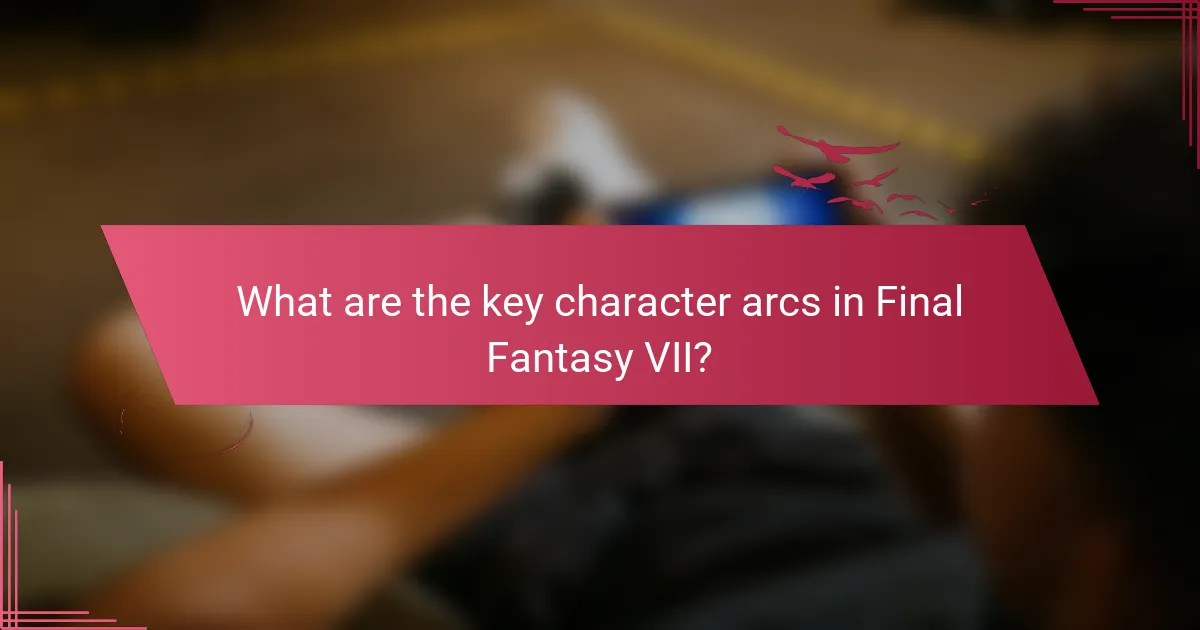
What are the key character arcs in Final Fantasy VII?
Final Fantasy VII features key character arcs that profoundly influence its narrative. Cloud Strife evolves from a confused mercenary to a self-aware hero, grappling with his identity. Tifa Lockhart transitions from a supportive friend to a strong, independent fighter, embodying resilience. Sephiroth’s arc represents a tragic fall from heroism to villainy, showcasing themes of loss and revenge. Aerith Gainsborough’s journey emphasizes sacrifice and hope, leaving a lasting impact on the game’s emotional landscape. These arcs collectively enhance the game’s cultural significance and emotional depth.
How does Cloud Strife’s journey reflect personal growth?
Cloud Strife’s journey in Final Fantasy VII exemplifies profound personal growth through self-discovery, overcoming trauma, and forming meaningful relationships. Initially, Cloud is portrayed as a stoic mercenary, struggling with identity and purpose. As the narrative unfolds, he confronts his past, revealing vulnerabilities and insecurities. This transformation is marked by significant events, such as the loss of friends and the realization of his own limitations.
Throughout the game, Cloud develops empathy and learns the importance of teamwork, which culminates in his acceptance of responsibility. His evolution reflects broader themes of redemption and resilience, resonating with players. The character’s growth is further emphasized by the game’s musical score, which enhances emotional moments and underscores the significance of his journey. Ultimately, Cloud’s story serves as a powerful narrative of healing and personal evolution.
What role do supporting characters play in narrative development?
Supporting characters are essential in narrative development as they enrich the story and enhance the main character’s journey. In “Final Fantasy VII,” characters like Aerith and Barret provide emotional depth and diverse perspectives. Their unique attributes contribute to the central themes of friendship and sacrifice, fostering player engagement. Supporting characters also drive the plot forward, influencing key events and decisions. This interplay creates a more immersive experience, highlighting the cultural impact of the game.
Which character relationships are pivotal to the storyline?
The pivotal character relationships in Final Fantasy VII include Cloud and Aerith, Tifa and Cloud, and Sephiroth and Cloud. These connections drive the narrative and deepen character development. Cloud’s bond with Aerith highlights themes of love and loss, while his relationship with Tifa explores friendship and support. Sephiroth serves as a formidable antagonist, challenging Cloud’s identity and purpose.
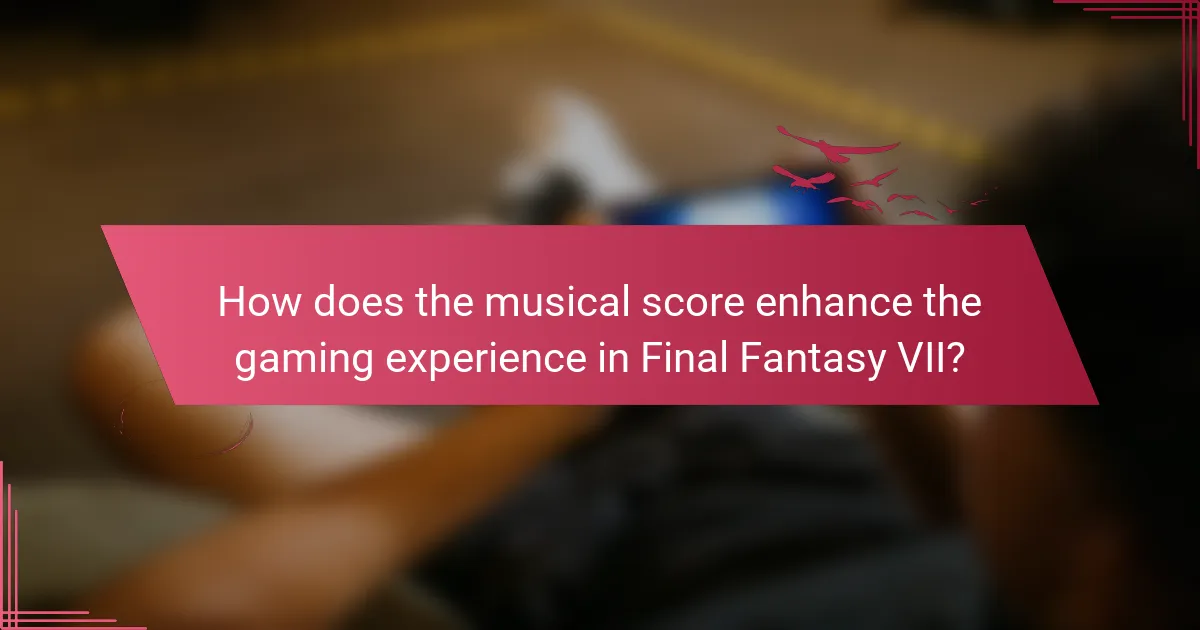
How does the musical score enhance the gaming experience in Final Fantasy VII?
The musical score in Final Fantasy VII significantly enhances the gaming experience by evoking emotions and deepening player engagement. Composed by Nobuo Uematsu, the score features a blend of orchestral and electronic elements that create a rich atmospheric backdrop. Iconic tracks, such as “One-Winged Angel,” elevate key moments, reinforcing narrative themes. The music also aids in character development, as specific themes represent individual characters, making their journeys more impactful. Overall, the score serves as a vital component, shaping the emotional landscape and immersing players in the game’s world.
What are the most memorable tracks from the soundtrack?
The most memorable tracks from the “Final Fantasy VII” soundtrack include “One-Winged Angel,” “Aerith’s Theme,” and “Tifa’s Theme.” These pieces significantly contribute to the game’s emotional depth and cultural impact. “One-Winged Angel,” known for its orchestral arrangement, captures the essence of the antagonist Sephiroth. “Aerith’s Theme” evokes a sense of nostalgia and poignancy, reflecting the character’s significance. “Tifa’s Theme” enhances the connection between players and Tifa, showcasing her complexity. Each track plays a crucial role in character development and narrative progression.
How does Nobuo Uematsu’s composition style contribute to the game’s atmosphere?
Nobuo Uematsu’s composition style significantly enhances the atmosphere of Final Fantasy VII. His use of varied musical themes evokes strong emotions, creating immersive experiences.
The score incorporates orchestral arrangements that reflect the game’s diverse settings, from the serene landscapes of Gaia to the tension-filled moments of conflict. Themes like “Aerith’s Theme” resonate deeply, highlighting character development and emotional stakes.
Uematsu’s unique blend of genres, including rock, classical, and folk influences, sets a distinct tone that contributes to the game’s cultural impact. The soundtrack not only supports the narrative but also strengthens player connections to characters and events.
Overall, Uematsu’s ability to intertwine music with gameplay fosters a memorable atmosphere that defines Final Fantasy VII’s legacy.
What impact did the soundtrack have on player engagement?
The soundtrack significantly enhanced player engagement in Final Fantasy VII. Its emotional depth and memorable melodies created a strong connection between players and characters. The music underscored pivotal moments, enriching the narrative experience. Iconic tracks like “Aerith’s Theme” and “One-Winged Angel” evoked intense feelings, fostering a lasting impact on players. This unique musical score remains a defining characteristic of the game’s cultural legacy.
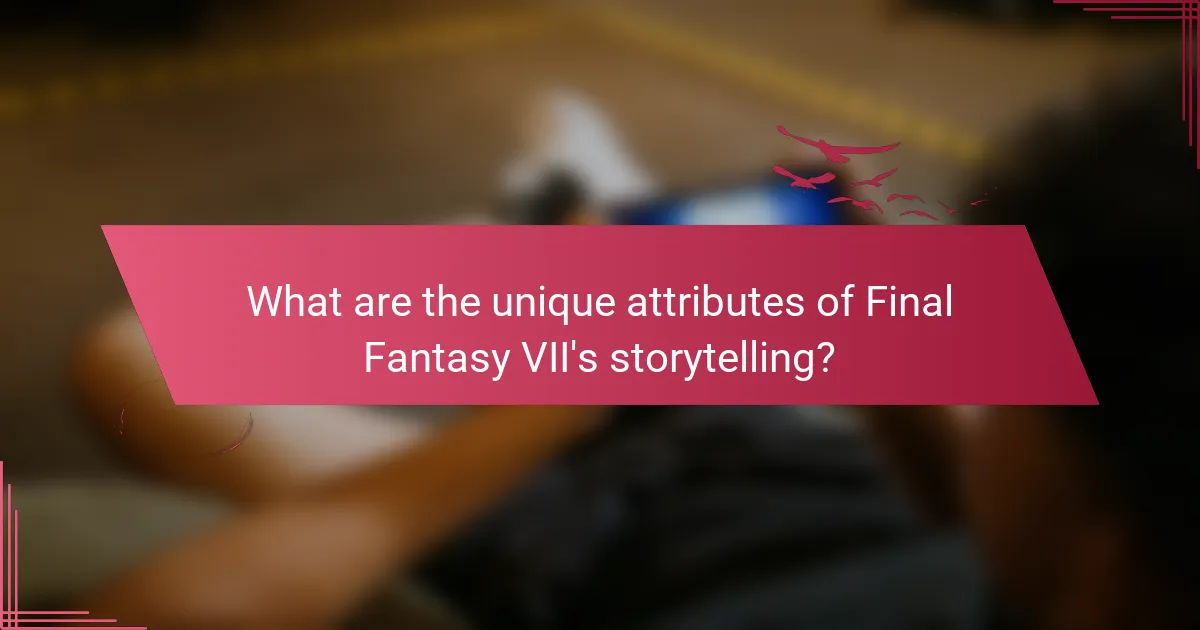
What are the unique attributes of Final Fantasy VII’s storytelling?
Final Fantasy VII’s storytelling features unique attributes such as complex character arcs, a rich narrative structure, and an emotional soundtrack. The game explores themes of identity and loss, enhancing player connection. Its non-linear plot and memorable dialogue further distinguish it within the RPG genre.
How does the game tackle complex themes like identity and loss?
Final Fantasy VII explores identity and loss through character arcs and narrative depth. The protagonist, Cloud Strife, grapples with his sense of self, influenced by memories and experiences. This journey highlights themes of personal growth and the impact of loss on identity. Characters like Aerith Gainsborough and Zack Fair further embody these themes, showcasing how relationships shape one’s understanding of self. The emotional resonance of these narratives is enhanced by the game’s musical score, which underscores pivotal moments of loss and discovery.
Which narrative techniques set Final Fantasy VII apart from its contemporaries?
Final Fantasy VII stands out due to its innovative narrative techniques, including complex character arcs, nonlinear storytelling, and thematic depth. The game explores existential themes, such as identity and loss, which resonate deeply with players. Its use of flashbacks and dream sequences enriches character development, allowing for emotional connections. Additionally, the integration of a memorable musical score enhances the storytelling experience, setting a tone that complements the narrative’s emotional weight.
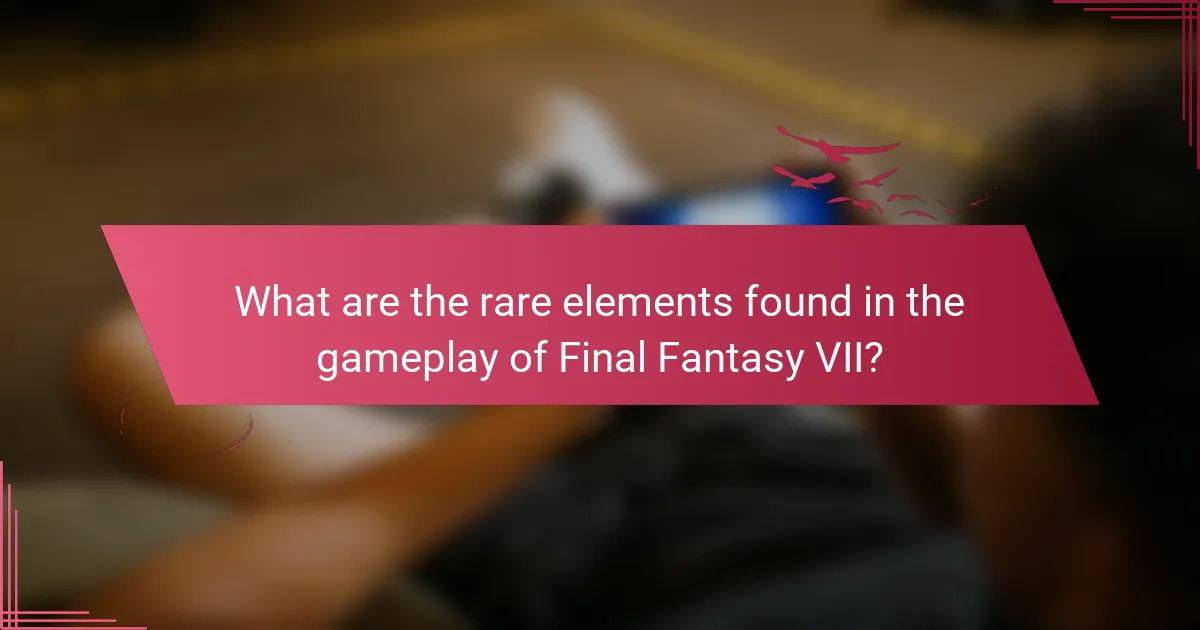
What are the rare elements found in the gameplay of Final Fantasy VII?
Final Fantasy VII features rare elements like the unique materia system, character limit breaks, and the intricate relationship dynamics among characters. These elements enhance gameplay depth and emotional engagement. The materia system allows customization of abilities, while limit breaks provide powerful combat options. Additionally, character relationships influence story outcomes, creating a rich narrative experience.
How do mini-games and side quests enrich the overall experience?
Mini-games and side quests significantly enhance the overall experience in Final Fantasy VII by providing depth to character development and world-building. These elements allow players to engage with the narrative in a more interactive way. For example, mini-games like Chocobo Racing offer unique gameplay mechanics and rewards, while side quests reveal backstories and enrich the game’s lore. This engagement fosters emotional connections with characters, making their journeys more impactful. Additionally, completing these quests often leads to rare items or abilities, further incentivizing exploration and interaction within the game world.
What makes the materia system a standout feature?
The materia system in Final Fantasy VII is a standout feature due to its unique integration of character development and gameplay mechanics. This system allows players to customize their characters’ abilities and spells through various materia types. Each materia has distinct attributes, such as elemental effects or stat boosts, enabling diverse strategies during battles. The flexibility to mix and match materia fosters a deep sense of player agency and personalization. Additionally, the visual representation of materia adds an engaging layer to the game’s aesthetic, enhancing its cultural impact.
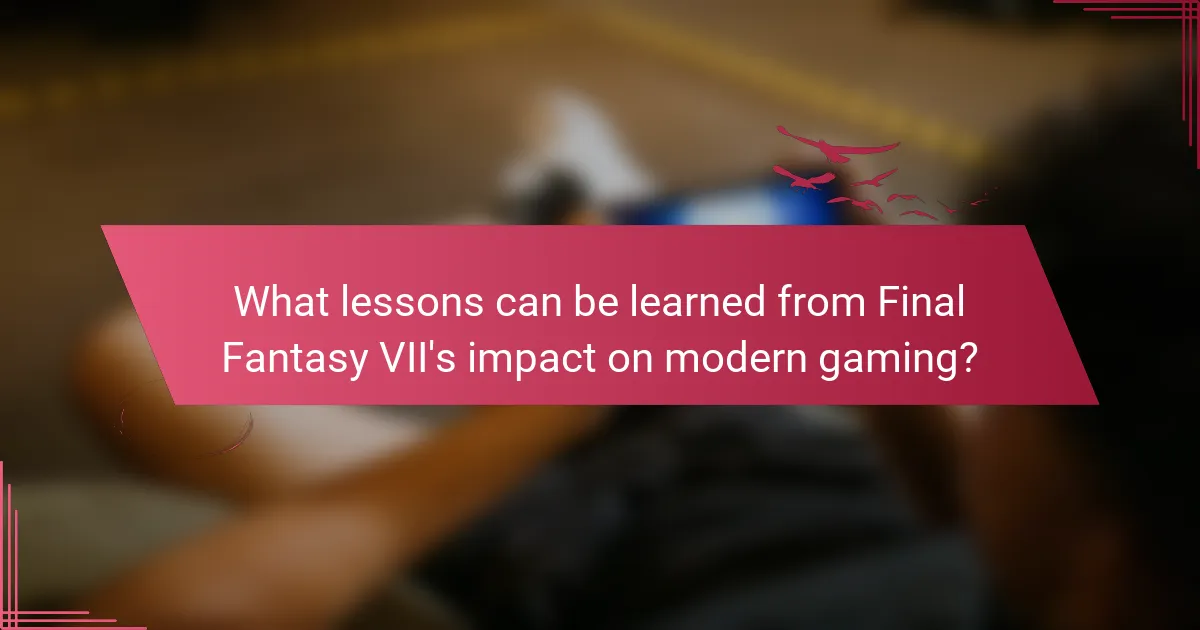
What lessons can be learned from Final Fantasy VII’s impact on modern gaming?
Final Fantasy VII significantly influenced modern gaming through its storytelling, character depth, and iconic music. The game’s narrative structure introduced complex themes, such as loss and identity, setting a new standard for emotional engagement in video games. Character development, particularly through protagonists like Cloud Strife, showcased intricate backstories that resonated with players, fostering deeper connections. The musical score, composed by Nobuo Uematsu, elevated the gaming experience, blending orchestral elements with memorable melodies that remain influential. As a result, Final Fantasy VII’s legacy continues to shape game design, narrative techniques, and soundtracks in contemporary gaming.
What best practices can developers adopt from Final Fantasy VII?
Developers can adopt several best practices from Final Fantasy VII, focusing on storytelling, character depth, and emotional engagement. Emphasizing character development fosters player investment. Integrating a compelling musical score enhances atmosphere and emotional resonance. Utilizing rich world-building creates immersive experiences. Implementing player choices can lead to unique narratives, increasing replayability.
How can understanding character development improve game narratives?
Understanding character development enhances game narratives by creating deeper emotional connections and enriching player experiences. In “Final Fantasy VII,” character arcs like Cloud’s transformation and Sephiroth’s backstory illustrate complex motivations, driving the plot forward. This depth fosters player investment, making choices and outcomes more impactful. Moreover, the interplay between characters adds layers to the narrative, allowing players to explore themes of identity, loss, and redemption. The cultural impact of the game further amplifies these elements, as the music score complements emotional moments, enhancing storytelling and engagement.
What common mistakes should be avoided when creating immersive game worlds?
To create immersive game worlds, avoid common mistakes like neglecting cultural depth, failing to develop characters, and overlooking musical integration. Each of these elements is crucial for engagement.
Cultural depth enriches the narrative, making it relatable and immersive. Insufficient character development leads to a lack of emotional connection, diminishing player investment. Music enhances atmosphere; ignoring it can weaken the overall experience.
Balancing these aspects ensures a cohesive and compelling game world. Prioritize cultural storytelling, character arcs, and a fitting musical score for a fully immersive experience.


